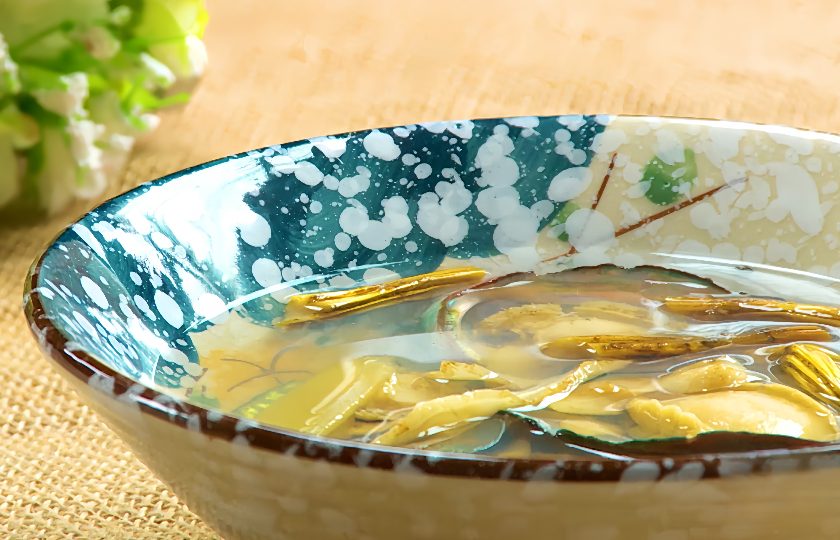Abalone Soup


The weather is dry in autumn and winter. This abalone soup is delicious and nutritious. I will cook it for my family every autumn and winter. Today, I will share this recipe with everyone. Come and make it with me!
About Abalone Soup
Abalone soup is a soup made with abalone as the main ingredient. Abalone, known as the "soft gold of the ocean", has tender meat and delicious taste. It is rich in nutrition, rich in high-quality protein, various amino acids, trace elements and minerals, which is good for human health.
In my recipe, two medicinal materials, dendrobium and American ginseng, are added. They add rich medicinal value to the abalone soup and have a strong health-preserving effect, making the nutrition of the abalone soup even higher.
Why I love this recipe
This abalone soup recipe is one of my favorites. The reason why I like it is, of course, first of all because abalone soup is rich in nutrition and can supplement nutrition for me and provide energy for my day's work.
Secondly, I really like the taste of abalone. Its meat is firm and chewy. After being made into soup, it has a strong seafood flavor. Every bite can enjoy a unique deliciousness.

Another thing is that this recipe adds dendrobium and American ginseng, which adds a medicinal fragrance and strong medicinal value to the abalone soup. Drinking a bowl in the cold winter is healthy and nourishing.
Finally, the appearance of this abalone soup is very high. Whether you drink it at home or use it to entertain friends, it is very delicate.
Ingredients Needed and Substitutions
Main ingredients
Abalone: It is the main ingredient for making abalone soup. It is rich in protein and has firm and delicious meat.
Side dishes
Dendrobium, American ginseng: Both are precious Chinese herbal medicines, which can help provide the nutritional value and edible value of abalone soup.
Ginger: It has a special aroma and is mainly used to remove fishy smell and increase fragrance, and help eliminate the fishy smell of abalone.
Condiments
Cooking wine: Provides the function of removing fishy smell and at the same time increases the flavor of abalone soup.
Salt: Provides saltiness and enhances the taste of abalone soup.
Substitutes:
Ginger: Can be replaced by vanilla and chopped scallions.
Dendrobium: Can be replaced by wolfberry.
American ginseng: Can be replaced by ginseng.
Cooking wine: Can be replaced by white liquor, yellow rice wine or wine.
Salt: Can be replaced by soy sauce and monosodium glutamate.
What are the benefits of abalone soup?
Abalone soup has the effects and functions of nourishing and maintaining health, enhancing immunity, promoting digestion, protecting eyesight and improving skin.
Nourishing and maintaining health: Abalone contains a large amount of high-quality protein and various vitamins. Eating an appropriate amount can provide necessary nutrition for the human body and enhance physical fitness.
Enhance immunity: Abalone soup contains a large amount of mineral elements such as calcium, iron, and phosphorus. Eating an appropriate amount can help improve human immunity and resist diseases.
Promote digestion: The vitamin substances in abalone soup can help promote the peristalsis of the human gastrointestinal tract and help digestion, which is good for human health.
Protect eyesight: Abalone soup contains nutrients beneficial to the eyes and helps maintain eye health.
Improve skin: The collagen and other ingredients in abalone soup have a nourishing effect on the skin and help maintain skin elasticity and luster. Eating an appropriate amount has a certain beautifying and nourishing effect.
Tips for Success: Tips for Success
Choose good quality ingredients
When making abalone soup, choose good quality ingredients. First of all, for abalone, choose fresh abalone with plump meat and bright color.
Dendrobium and American ginseng should also be of high quality and free of impurities, so as to provide rich nutrition for abalone soup.
Blanching skills
Abalone should be blanched first. Blanching can help remove the fishy smell and impurities of abalone. However, it should be noted that the blanching time of abalone should not be too long to avoid the abalone meat becoming old.
Secondly, the abalone shell should also be blanched. The abalone shell mainly plays a role in decoration and increasing the umami taste of the soup base. Blanching can make the soup clearer.
Pay attention to the heat
When making abalone soup, it is very important to control the heat. Remember to steam slowly over medium-low heat to ensure that the abalone can fully absorb the taste and nutrition of the accessories and avoid the taste becoming weak due to excessive evaporation of the soup.
Proper seasoning
Salt is the main condiment for abalone soup. When using salt, pay attention to the amount. Don't use too much, otherwise the abalone soup will become salty.
Cooking wine: Although cooking wine is mainly used to remove fishy smell, it can also add the aroma of soup. You can add some appropriately when seasoning, but also pay attention to the amount so as not to cover the umami taste of abalone.
Pay attention to the steaming time
The steaming time of abalone soup should be well controlled to ensure that there is enough time for the abalone to be fully stewed and flavored. Generally speaking, a steaming time of 1 hours is more appropriate, and it can be adjusted appropriately according to the size of abalone and taste requirements.
Choice of utensils
This is a very important point. When steaming abalone soup, choose the right utensils. Choose the right steamer and steaming bowl to ensure that the soup will not overflow or evaporate too much during the steaming process. The material of the steaming bowl should also be high-temperature resistant and not easy to break. Ceramic is the best.
INGREDIENTS
Main Ingredients
-
·4 abalones
Additional Ingredients
-
·10g ginger
-
·10g dendrobium
-
·10g American ginseng
Seasonings
-
·10ml cooking wine
-
·3g salt
COOKING STEP
Step 1
Prepare ingredients:
Cut 10 grams of ginger into slices, wash 4 abalones and set aside, and wash 10 grams each of dendrobium and American ginseng.

Step 2
Blanch abalone:
Pour 500 milliliters of hot water into the pot and bring to a boil. Put the abalone meat in and blanch for about 1 minute, then take it out.
Then put the abalone shell into the pot and blanch. Take it out after the water boils.

Step 3
Assemble abalone and accessories:
Take a suitable bowl, put the blanched abalone shell in it, and then put the abalone meat into the shell.
Add ginger slices, dendrobium and American ginseng to the bowl.

Step 4
Season and add water:
Drizzle 10 milliliters of cooking wine, pour in an appropriate amount of clear water to make sure it can cover the abalone, and then add 3 grams of salt and stir well.

Step 5
Steam abalone:
Add water to a pot and place a steaming rack inside. Set the bowl with the abalone on the rack. Cover and steam over medium-low heat for 1 hour. Make sure to monitor the water level to avoid burning.

Step 6
Enjoy:
When the time is up, you can take out and enjoy the delicious abalone soup.

More delicious soups worth trying
Deliciously Nourishing Classic Choice: Fish Head Tofu Soup
Refreshing Sweet Sea Kelp & Mung Bean Soup - Nutritious Delight
Red Date Longan Sweet Soup With Egg
Serving Suggestions
Recommended combinations
Rice: Abalone soup is very suitable to be eaten with rice. Soaking rice in abalone soup and taking a bite is particularly delicious.
Stir-fried broccoli: Abalone soup has a rich taste and can be eaten with refreshing vegetables, such as stir-fried broccoli, which can help neutralize the taste of broccoli.
Beef: If you want to enrich nutrition and taste, you can also eat it with beef.
FAQs:
When cleaning, you can use a brush to clean the shell of the abalone, and then use a small knife or spoon to take the abalone meat off the shell completely. The black mucosa and internal organs on the abalone meat can be soaked in salt water and then rubbed and washed.
But if you think that cleaning and handling abalone shells is more troublesome, you can also not use them.
Small Abalone (weighing about 10-15g each): Steam for around 30 minutes.
Medium-Sized Abalone (weighing about 20-30g each): Steam for about 45 minutes.
Large Abalone (weighing over 30g each): Steam for about 60 minutes.
When the amount of water covers the abalone, it can ensure that the abalone fully absorbs the taste of the soup during the steaming process and makes the tastes of various ingredients better blend in the soup.
If there is too little water, some abalones may not be soaked in the soup, and the taste will not be strong enough; if there is too much water, the taste of the soup may be relatively weak.

















